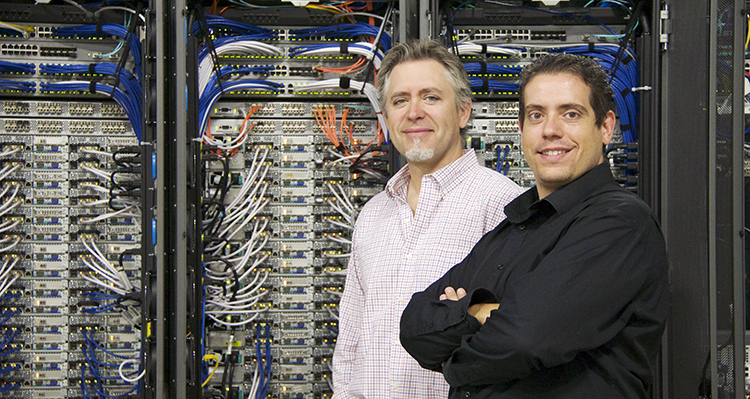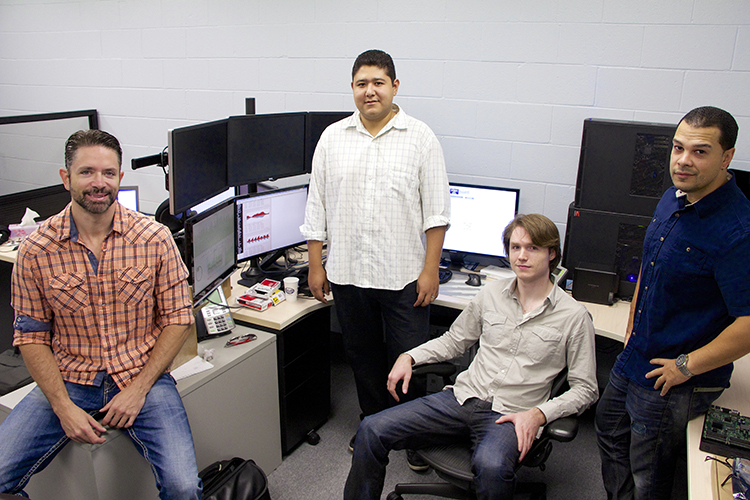It began as part of an internal side project aimed at rekindling the entrepreneurial spirit within an established 200-employee tech company.
Less than a year later, Cloud at Cost – a hosting service with a $35 one-time fee and no monthly bill – has raked in $1 million without any marketing, and injected fresh energy into Fibernetics, a Waterloo Region-based telecom provider founded 11 years ago.
The cloud service’s early success suggests that a company need not lose its startup mojo as it matures, and can channel it as a way to retain talent and stay innovative.
Cloud at Cost is among an initial crop of five seedling companies being nurtured under Fibernetics Ventures Inc., the company’s new in-house incubator. In addition to investment, FVI provides office space and logistical support to the Fibernetics employees heading up these “intrapreneurship” activities. (FVI has also backed one outside startup, Plasticity Labs, as lead investor in the company’s $2.1-million round announced in August.)
Beyond simply providing new revenue streams, the in-house seedlings have given Fibernetics employees a fresh incentive to stay with the company, via equity in the new ventures they launch.
They have also given Jody Schnarr and John Stix – who started Fibernetics in a basement in 2003 – a welcome and powerful reminder of why they went into business in the first place.
“As we started getting bigger, going from a 10-person startup back in 2003 to 200 people in our organization, certain people didn’t enjoy themselves as much any more,” Schnarr said in an interview. “Cloud at Cost came from a couple of people who wanted to move on, but they were valuable friends, valuable employees . . . This way, we keep working together.”
One of those employees is John Cullen, who had worked in Fibernetics’ telecom wholesale division since the company’s earliest days.
As the company matured past the startup phase and settled into a stable enterprise, Cullen was looking to start his own wholesale business. But Schnarr didn’t want to lose him.
“I told him, ‘You know, you’ve always been a great employee; we’ve always worked well; why don’t we do something together? I’ll fund it,’” Schnarr recalled.

Fibernetics CEO Jody Schnarr (left) and CTO Francisco Dominguez in front of
the Cloud at Cost compute nodes in the company’s Kitchener data centre.
(Communitech photo: Anthony Reinhart)
The result was FVI’s first seedling, called Rack & Data, a public co-location and hosting facility. Cullen, with Fibernetics as his equity partner in the venture, oversees its operations in a data centre in Kitchener, a few kilometres from Fibernetics headquarters in Cambridge.
The 11,000-square-foot facility boasts a data centre filled with servers and related equipment Fibernetics was able to acquire at deep discounts, and a rooftop solar array that generates more power than the operation uses. The servers access the same network upon which Fibernetics’ Internet and phone business is based.
These elements provided an ideal platform on which to build Cloud at Cost, Schnarr said.
“I had a couple of other people looking to start something new, and we ran through a bunch of ideas, and Cloud at Cost came out,” he said. “That really gave us the unfair advantage to go ahead against other [cloud] companies that have to pay for space and power and Internet and all those things.”
In setting the $35 one-time price for its basic service, Cloud at Cost used the compact-but-powerful Raspberry Pi computing device as a benchmark, Schnarr said.
“The Raspberry Pi is a similar price; it’s $35 and everybody I know has one or two sitting on their desk,” he said. “They’re not necessarily using them, but $35 is an easy purchase to get something that you can categorize as a toy, and get on it and play around.”
The difference with Cloud at Cost is that it’s “on a network, connected and up all the time,” although faster-than-expected growth – more than 3,000 developers from 70-plus countries have signed up for the service – did lead to some outages over the summer.

The Cloud at Cost dev team (left to right): Pat Schnarr, Isaac Garcia, Max
Lukjanenko and Gerald Camacho. (Communitech photo: Anthony Reinhart)
With fresh improvements in place, Cloud at Cost 2.0 is poised to launch publicly in November, and expects significant increases from the 700 to 800 new orders it’s now seeing daily.
While a $35 fee sounds difficult to sustain, Schnarr said a portion of it is set aside for future costs, and that ongoing technical advancements – including the use of smaller computing units that use one-fifth the power of the current servers – will lower costs even further.
“A portion of the purchase has to be tucked away and used to pay for the power,” he said, ‘but we also know that every three years, these efficiencies double, so we can fit more and more computers on less space, less power and less footprint.”
Less tangible, but just as important to Schnarr and Stix, is the entrepreneurial power surge they’ve felt from these new ventures.
When they first went into business in 1994, almost a decade before Fibernetics launched, “We both looked at each other and we knew the reason we were starting a business was because we didn’t want to work,” Schnarr said. “I didn’t fully understand what that meant when I said it, but we didn’t want to work. What we wanted to do was stuff we enjoyed.”
Of course, they ended up working hard for years, “but when you look back, you don’t see any of it as actually work. You’re living your day doing the things you love doing.”
As a business eventually grows into something sustainable and profitable, Schnarr said, there’s a tendency for the entrepreneur to forget about the love part and start to think, ‘Well, I work to make money,’ and begin adding new components to their company with that sole motivation.
This often just creates more expense as dubious new features or divisions are added to the existing business, he said.
“It’s because you don’t have the entrepreneur in it; what you have is a department and cash and spending, and people that you’ve given a task to do,” Schnarr said. “But with intrapreneurship, we’re taking real entrepreneurs and giving them equity in something that they can build themselves, and we help push it along.”
In a community teeming with startups, it’s great to see one of the grownups using its resources to feed the ecosystem.
Anthony Reinhart is Communitech’s Director of Editorial Strategy and senior staff writer. View from the ‘Loo looks at the issues, people and events that shape Waterloo Region’s technology sector.

